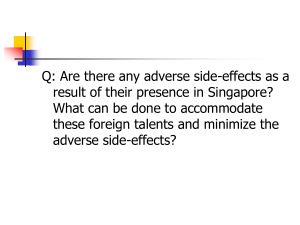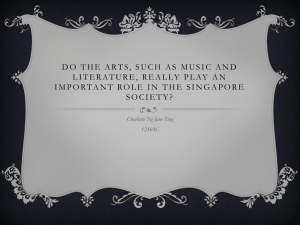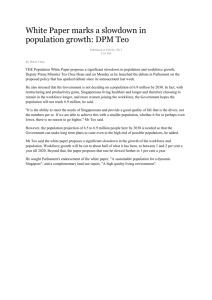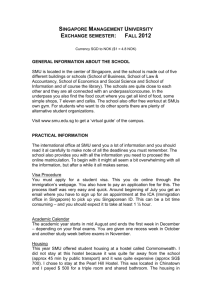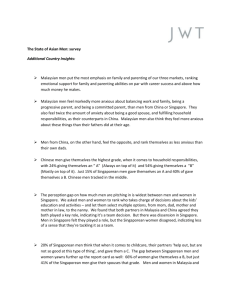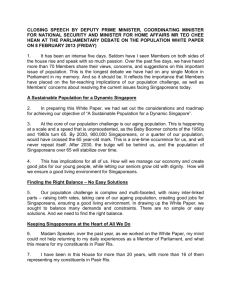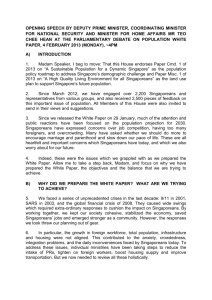The Ugly Singaporean – Sample Essays (MS Word)
advertisement
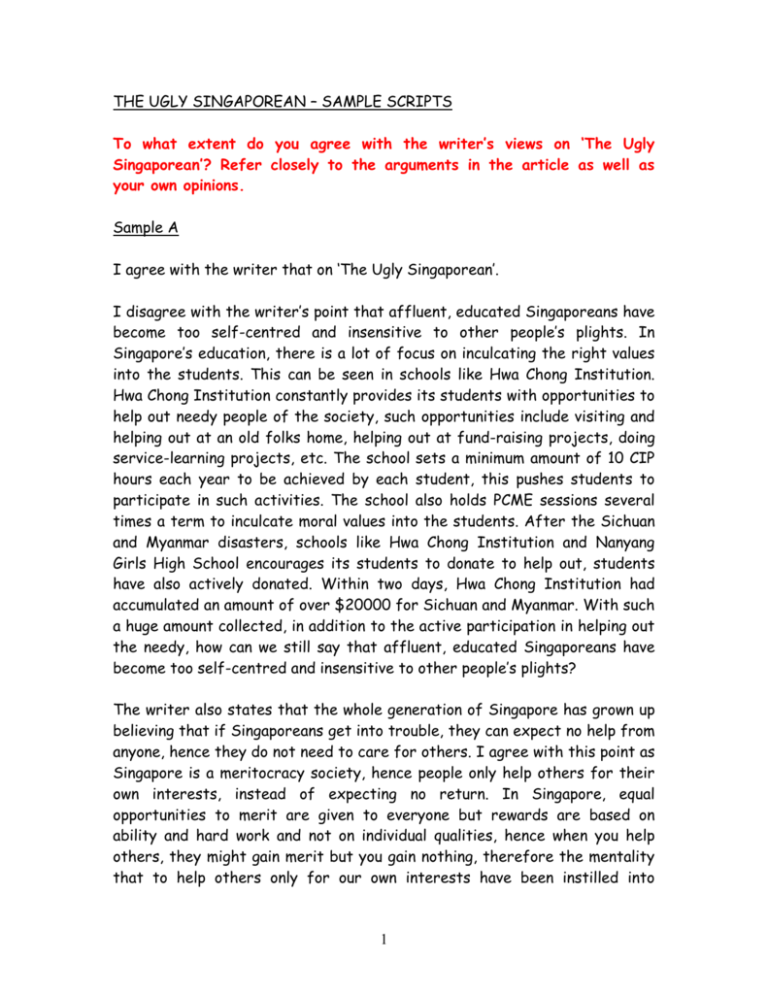
THE UGLY SINGAPOREAN – SAMPLE SCRIPTS To what extent do you agree with the writer’s views on ‘The Ugly Singaporean’? Refer closely to the arguments in the article as well as your own opinions. Sample A I agree with the writer that on ‘The Ugly Singaporean’. I disagree with the writer’s point that affluent, educated Singaporeans have become too self-centred and insensitive to other people’s plights. In Singapore’s education, there is a lot of focus on inculcating the right values into the students. This can be seen in schools like Hwa Chong Institution. Hwa Chong Institution constantly provides its students with opportunities to help out needy people of the society, such opportunities include visiting and helping out at an old folks home, helping out at fund-raising projects, doing service-learning projects, etc. The school sets a minimum amount of 10 CIP hours each year to be achieved by each student, this pushes students to participate in such activities. The school also holds PCME sessions several times a term to inculcate moral values into the students. After the Sichuan and Myanmar disasters, schools like Hwa Chong Institution and Nanyang Girls High School encourages its students to donate to help out, students have also actively donated. Within two days, Hwa Chong Institution had accumulated an amount of over $20000 for Sichuan and Myanmar. With such a huge amount collected, in addition to the active participation in helping out the needy, how can we still say that affluent, educated Singaporeans have become too self-centred and insensitive to other people’s plights? The writer also states that the whole generation of Singapore has grown up believing that if Singaporeans get into trouble, they can expect no help from anyone, hence they do not need to care for others. I agree with this point as Singapore is a meritocracy society, hence people only help others for their own interests, instead of expecting no return. In Singapore, equal opportunities to merit are given to everyone but rewards are based on ability and hard work and not on individual qualities, hence when you help others, they might gain merit but you gain nothing, therefore the mentality that to help others only for our own interests have been instilled into 1 Singaporeans. During school competitions like physics olympiad, only the top elites of each school are sent to represent the school, hence students will have to compete with each other for the few positions to represent the school. If the students help each other, they will have a lesser possibility of representing the school since everyone will have the equal abilities, but if they do not help each other, the ones with better abilities will get the representation. Therefore, naturally those with better abilities will not go around helping the rest since that will decrease his possibilities of getting the reward in the end. The author also points out that the political elite, followed by and large by the citizenry, takes after Minister Mentor Lee Kwan Yew’s generally nowelfare, harshly competitive and unsentimental leadership. I agree with the writer’s point since the reason that Singaporeans only help others for the merit is mainly because of the environment we grow up in. The way people around us do things greatly influence how we do things, especially when the successful people in Singapore like Minister Mentor Lee also do things in the same way. As Singapore is a small country with little resources, there is a lot of competition in this meritocracy society, especially now with the addition of foreign talents. Although this helps out with Singapore’s growth, this has caused Singaporeans to only be concerned about their own interests and not about other people since this is the best way to survive in this harshly competitive society. In schools, students learn under humanities what kind of decisions politicians made and how they were successful, hence students tend to follow the way these successful politicians do things. In conclusion, although we are taught and provided with opportunities to help others during our education, when we start working, under the influence of how everyone does things due to the meritocracy society, we still care only for our own interests and not about others who are needy. Your Opinion: Band Reasons 2 Sample B Have you wondered whether the high and mighty Singaporeans could also have an ugly side? Or have you known that this so called characteristics in the practical Singaporeans? However, most Singaporeans do possess qualities that a world class society requires of its citizens but there is only a handful of black sheep who tarnish Singapore’s image. Therefore, I do not agree with the writer completely. I agree fully with the writer’s claim “that a mature, developed country isn’t defined only by wealth and education; it is also about humanity and concern for others” Singaporeans pride on being a first-world country and a garden city with high technological capabilities. Singaporeans would then have to constantly remind themselves that their behaviors and must be considerate enough to live up to the country’s reputation. A small minority of Singaporeans are always tarnishing Singapore’s reputation with their inconsiderate acts, making people generalize that Singaporeans are by and large inconsiderate, selfish and self centered people by nature. An example is when a smartly dressed man with a Rolex watch on his wrist fighting over a packet of rice at a grocery fair for the needy with a poor old lady who only has $10.00 in her purse to get as much as she could. I feel that these incidents are so news-worthy and attention-grabbing mostly because these people are the elite, and we expect better behavior from them. But if you think about it, such behavior can be seen in various parts of society, regardless of whether or not they are elite. There are gangs of school drop-outs who beat each other up on a regular basis. People making racist remarks whom are not from NUS. So I think that yes, it's very sad that we see such shameful incidents involving people who should well know better, but I don't really think that elitism breeds lack of empathy. The lack of empathy is a separate, society-wide problem that needs to be tackled. Educational campaigns are not enough; everyone has to play a part in making Singapore a gracious society. I do not fully agree with the writer’s opinion that the Singaporean tourist “reflects the overall selfishness and self-centeredness of middleclass Singaporeans". Indisputably we often can see Singaporeans’ ugly side from ignoring or evening despising people from the less fortunate families to 3 snatching and fighting for seats from old people on the MRT or bus. However, I emphasize that this handful of black sheep only represent a mere minority of the Singapore population and the writer is generalizing the case. The tragedy and death toll of the massive Sichuan earthquake have touched the hearts of many people both in China and elsewhere, including Singaporeans. Countless Singaporeans donated generously to the donation drive organized by schools, Red Cross, The Salvation Army etc. to render monetary help to the victims of the disaster. Hawkers voluntarily put up signs that they will donate their day's earnings to the victims. People queued up at the Chinese Embassy to donate in thousands or tens of thousands of dollars, in cash or by cheques. The Singapore government also made an effort donate US$200,000 to the Chinese government and send in rescue teams to the disaster zone in response to an appeal for foreign aid for the Sichuan earthquake victims. These show that on the whole, the majority of Singaporeans are caring and helpful people but not uncaring and uncharitable as mentioned by the writer in the passage. As mentioned by the writer in the passage, the case of the Singaporean traveler who was creating a din and made a fuss out of the experience was surely an isolated case. He was the only member in the group who was so agitated and selfish while the other members of the group remained calm and helpful. By condemning the whole nation for doings of certain individuals and the minority, I believe that the writer is over generalizing the case. In conclusion, I do not agree with the writer that Singaporeans are ugly. It's inevitable there are some black sheep but this is not unique to our society only. If you are ready with a smile, and ask if u need help, I think you'll find that there's warmth in a typical Singaporean on the street, who's forthcoming with their help. Even for those who display ugly and inconsiderate behaviors, I believe their ugliness by and large is NOT reflective of an ugly heart, but rather "each man for himself" mentality or "there's no free lunch" mentality deep rooted in them. The examples the writer discussed only represent a mere minority of Singaporeans. However, it is definitely true that a mature and gracious society must have kind and caring citizens. 4 Your Opinion: Band Reasons Sample C Throughout the article ‘The Ugly Singaporean’, the writer brings up many points, all which revolve around the atrocious conduct of Singaporean. Indeed, certain facts which are mentioned in the article do reflect badly on Singaporean’s attitude. However, much of the arguments within the article is simply speculation and only proven by over-generalized statements made by the author. Therefore, I disagree to a large portion of the writer’s case. The writer states that the traits often attributed to affluent, educated Singaporeans include self-centeredness and insensitivity. I wholly agree to this view of Singaporeans as there are many examples within our society which effectively substantiates this statement. Both the writer’s description of the insensitive Singaporean tourist and his example of ugly Singaporean behavior like people rushing for train seats and inconsiderate driving are relevant and commonplace within Singaporean’s community. There are many other cases which portray Singaporean’s self-centeredness, most obviously are the results of many fund-raising charity programs like the Starbuck’s event. Most people at the event, even white collar workers were present to take advantage of the ‘free’ coffee and only a few had intentions of donating. Eventually, Starbucks only collected $16,000 dollars for 14,000 cups of coffee, a clear loss in capital for Starbucks. This clearly illustrates the selfishness of a large majority of Singaporeans. Therefore, this collective mentality of self-centeredness and blatant portrayal of insensitivity has indisputably marred the image of the supposedly affluent and educated Singaporeans. However, further down the article, The writer speculates that this selfcenteredness and insensitivity might be due to the each-man-for-himself mentality present in Singapore’s environment. He claims that this is 5 reflected in the upper level of Singapore’s leadership, stating that Minister Mentor Lee Kuan Yew has a no-welfare, harshly competitive and unsentimental leadership and Singapore rarely gives charity to countries in need. Evidence that this is false can be seen from the generous donations made by Singapore to the victims of the recent Sichuan earthquake. The charity show broadcasted on television raised $6.85 million just purely out of donations done in goodwill. Singapore’s government also did not levy the 7% GST tax on this money. This proves Singapore’s society does not promote an each-man-for-himself mentality and the government of Singapore does have compassion towards countries in need. Lastly, the writers said that Singapore’s government has a perception that a class divide within Singapore between the elites and the rest of the population is necessary to encourage people to strive harder in life. This is simply over exaggeration of the idea in which Wee Shu Min and her father was trying to explain. This argument is similar to that between a communist thinking and a capitalist thinking. In order for a communist society to work, everyone has to strive equally hard, however that is not often the case. Thus, Singapore has adopted a system in which the hardworking and clever rise to the top which the disadvantaged and lazy do not rise. However, the wroter failed to mention the situation in reality, including the many policies which Singapore has adopted so as not to leave these disadvantaged behind. For example, the government has been stressing on re-training, skills upgrading and re-adapt to aid workers deprived through structural unemployment and workers in their old age. Many monetary subsidies are given to the poor to help them get by, and alternative routes in education help weaker students obtain equally useful skills in life. Hence, Singapore is a society that rewards the hardworking and smart, but is in no way and elitist society which despises the disadvantages. Thus, in conclusion, I agree with the writer’s stand that Singaporeans as individuals are indeed self-centered and insensitive. However, in my opinion this is no implication on the morality and ideas of our society or government as a whole. Consequently, it is my belief that the writer has formed untrue ideas of his own about the Singaporean society simply by extrapolating trends and exaggerating certain events that might simply be isolated cases. 6 Your Opinion: Band Reasons Sample D I agree largely with the views of the writer on ‘The Ugly Singaporean’ that certain Singaporeans have become too self-centered and that a mature country is also defined by its humanity. Firstly, I do not agree with the writer’s opinion that the embarrassing behaviour of the Singaporean tourist in China “reflects the overall selfishness and self-centeredness of middle-class Singaporeans.” I feel that it is not justified for that particular Singaporean tourist to be held accountable and responsible for all the middle-class Singaporeans as it was only that one individual who created such a furor. While he complained, many other Singaporeans kept their cool and were sensitive enough to understand what was appropriate at that time. Furthermore, when news of the Sichuan earthquake got out, many Singaporeans, across the varied social strata, immediately rallied together willingly, collecting money and donating aid for the earthquake victims. Some even took it a step further and went over to China personally, braving the dangers to help out in whatever way they can. Their heartfelt and noble deeds were a far cry from the insensitive, selfcentered and apathetic reaction from the Singaporean tourist. This is a clear indication that not all middle-class Singaporeans are like that particular Singaporean black sheep. Secondly, I agree with the writer’s opinion that “a mature, developed country isn’t defined only by wealth and education; it is also about humanity and concern for others” In reference to the article, I too believe that there is more to a First World City and a mature country than just the standard of infrastructure, education and economy. Yes – the standard of living has to be maintained and Singapore’s only resource (our young minds) has to be refined 7 to truly shine in the future. However, what our government leaders cannot forget is that no matter how intelligent, rich, revolutionary or innovative our country is, the social attitudes of our people will always betray us, to invite others to peer beyond the shiny veneer and realize, that Singapore, severely falls up short in the social attitude area. The social attitudes of the people show how a country is able to bestow its people with social consciousness, sensitivity and to educate the virtues of a caring heart. In such a volatile world where wars have been fought over the wrong words, such sensitivity and social consciousness can be of utmost importance. The social attitudes of Singapore not only affects the way other countries view us and consequently interact with us through trade, diplomacy or agreements but it also has great bearing on the dynamics of the country and whether it can be called a mature, developed one. To be truly a mature, developed country, Singaporeans have to be concerned for others and not insensitive to the plight of others, only then can we start caring for the person next to us enough to start caring for other countries. By this, only then would we be fulfilling our role as part of the international community as a mature and developed country. In conclusion, I disagree with the writer that most middle-class Singaporeans are self-centered and insensitive while I agree that a mature developed country has to have good social attitudes and social conciousness. Your Opinion: Band Reasons 8 Sample E The Singaporean citizens are notorious for many ugly traits — one of them being their selfishness. While most Singaporeans possess all the wonderful qualities that a mature society requires of its citizens, there are always a handful of black sheep who tarnish Singaporeans’ image. As such, I do not completely agree with the writer’s views. I do not fully subscribe the writer’s opinion that the incident of the Singaporean tourist ‘reflects the overall selfishness and self-centeredness of middle-class Singaporeans’. Though we can often observe some Singaporeans’ ugly behaviors which range from fighting for seats on MRT to ignoring of the plight of the less fortunate, this group only represents a minority of the population. Take the case of the Singaporean tourist who made a fuss about his experience in Sichuan. He was the only member in the group who was so agitated and selfish. Other Singaporeans remained relatively calm and complained little. Furthermore, following the earthquake, many Singaporeans contributed selflessly to the donation drive to support the victims of the disaster. The Singapore government was also one of the few in the world which made an effort to send rescue teams to the disaster zone. All these show that, by and large, Singaporeans are helpful and compassionate souls rather than the uncaring and uncharitable lot described by the writer. The incident of the scholar-daughter of a MP making inappropriate remarks is, again, an isolated one. The very fact that a ‘nationwide condemnation ensued’ proves that most Singaporeans have a strong sense of justice and that they do empathize with the needy. By criticizing the entire population for the vice of one (or a few) individual(s), the writer is generalizing the issue at hand. Moving on, the writer claims that a ‘mature, developed country isn’t defined only by wealth and education; it is also about humanity and concern for others’. I cannot agree more with this. The more Singaporeans pride on being a clean and green first-world country with advanced technological infrastructures, the more Singaporeans have to constantly remind themselves that their behaviors must be appropriate and considerate. As aforementioned, a minority of Singaporeans are always marring Singapore’s name with their acts of disgrace, giving rise to the “Ugly Singaporean” phenomenon which, sadly though, transcends all genders, ages, races or 9 religions. In view of this, I feel it is the responsibility of the government as well as the society as a whole to reduce such instances of ugly episodes. Educational campaigns organized by the government alone are not enough, what we really need is for everyone to be a social watchdog — to seize out those uncaring individuals and publicly humiliate them for their selfcenteredness. I do know that the reprehensible attitude of some can never be eradicated entirely. But if everyone bothers to be just a little more gracious, a little more conscious, a little more thoughtful — wouldn’t that make Singapore a much more gracious society? In conclusion, I do not agree with the writer that Singaporeans are all egocentric gits as the examples he discussed only represent a minority of Singaporeans. However, it is true that a mature and gracious society should have kind and humane citizens. Your Opinion: Band Reasons Lokelf/Aug2008 10
